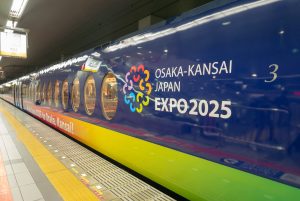Japan’s preparations to host the Osaka World Expo in 2025 has been hit with construction delays that threaten the opening of the event. The main goal of the World Expo is to showcase the achievements of nations. There are over 150 countries participating, of which 56 countries including the United States, China, Germany, Switzerland, and the Netherlands are expected to design and build their own exhibition pavilion at their own cost. But there are concerns that soaring construction materials costs and labor shortages will lead to some foreign countries withdrawing from the Expo.
Overseas pavilions are considered a major tourist draw. The six-month event is estimated to attract some 30 million people and generate $15 billion in revenue. With delays piling up and costs mounting, the business community is calling for the opening date to be pushed back – or for the Japanese government to build each foreign country’s pavilion on their behalf.
There has been a series of budget miscalculations for the Osaka 2025 World Expo. Since the Japanese government applied to host the multinational event in 2017, construction as well as operating and security costs have risen thanks to the COVID-19 pandemic and the Russian invasion of Ukraine. The initial construction cost was estimated at $898 million, but that has increased by an additional $420 million. These costs are covered equally by the government, Osaka municipal government, and the business community. With business leaders calling for the government to cover pavilion costs, however, the financial burden on taxpayers could deepen further.
There are now less than two years until the Osaka World Expo grand opening on April 13 2025. Yet as of mid-July, Osaka municipality authorities said that not one country had filed the necessary construction application in order to receive an Osaka building permit by the deadline. By the end of the month, South Korea was the first country to have submitted a basic plan for construction, and since then five other countries have followed suit. It’s believed that most countries are struggling to secure local builders and contractors.
The Japan Expo Association says the application process takes four months until building permit approval. There are concerns these pavilions could face longer delays as permit applications are submitted late. The association is calling on the construction industry for their cooperation and has promised to help participating countries find contracting companies.
Construction plans need to be urgently finalized if the pavilions are to be built in time. The National Federation of Construction Companies says the two-year building timeframe is extremely short and it is a major reason that small to medium construction companies are reluctant to take on building contracts for the Expo. The group also says that supply shortages mean procuring materials is likely to take longer than normal and come at a higher cost. In particular, the increasing prices of cement and steel, alongside wage increases for construction workers as a result of a labor shortage, are a major setback for small to medium sized builders.
Last week, Japanese Prime Minister Kishida Fumio stressed that while the construction of the pavilions has been seriously delayed, the Expo will go head on schedule. Kishida said the government would insure domestic construction companies against non-payment of material costs to overseas suppliers. The Ministry of Economy, Trade, and Industry also said they will accelerate the procedures needed to build pavilions as early as possible.
The Osaka World Expo gives Japan the chance to show the world its technological advances. Japan was the first Asian country to host the World Expo in 1970. It was hailed as an architectural marvel and a source of national pride, with Japanese companies unveiling the first cell phone technology and a flying car concept. The invention captured global audiences, and an updated, state-of-the-art flying car will be the main feature of the 2025 event.

































